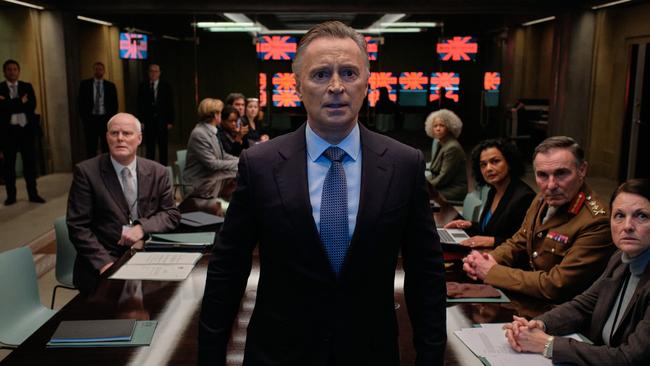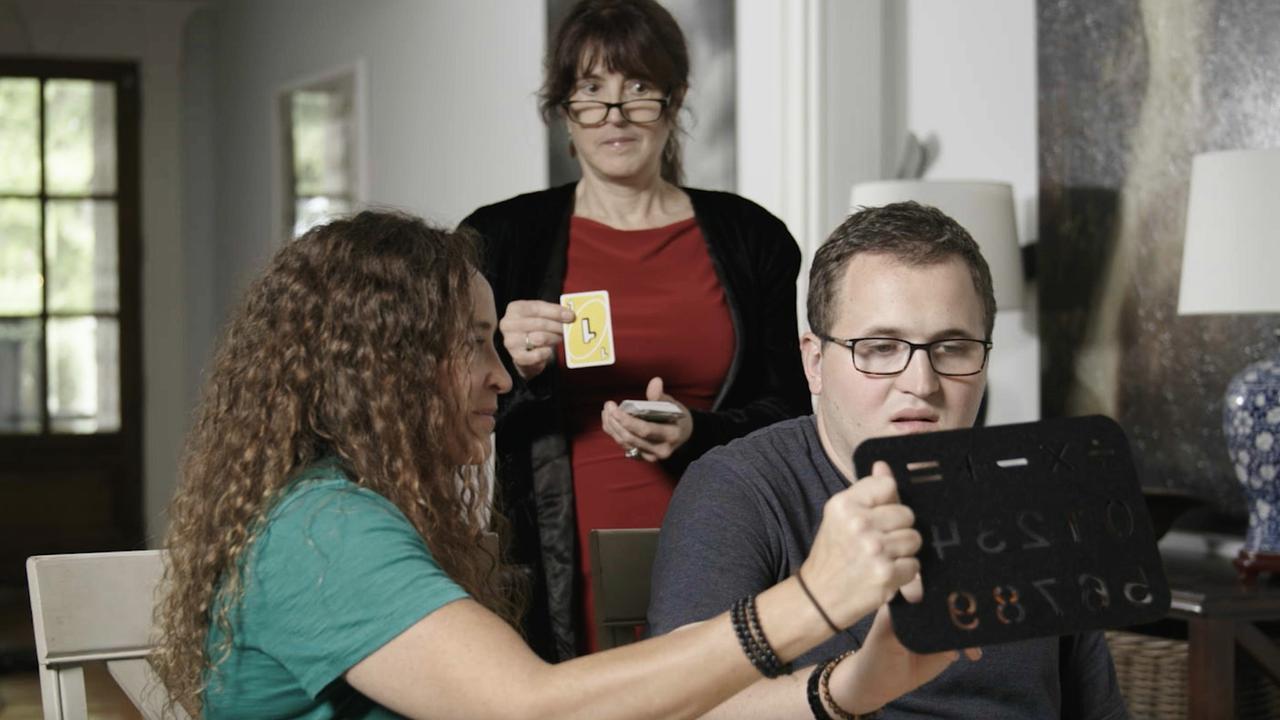Cobra: Cyberwar: Action with a political edge
Cobra: Cyberwar is perfect if you find yourself back in isolation asking yourself whether our leaders really have the requisite courage to enable us to survive our own disaster.

It’s just a little hard to understand the appeal of a disaster series, those narratives of survival and endurance, like the popular British thriller Cobra: Cyberwar. It’s just finished up on Foxtel but is still able to be watched in its entirety on demand.
As an aside, it’s interesting how many major TV distributors are now sending out shows week by week, probably to encourage the social media experience in which hit series like Succession become weekly juggernauts that legions of viewers can experience together. As the writer Joe Berkowitz suggested in the first year of the pandemic, 2020 was an unforgettable lesson in how much people value feeling connected to each other. “Watching television has often been seen as a barrier to connection, the opposite of spending quality time, but throughout the pandemic it became a hub of shared humanity.”
When it comes to disaster series maybe it’s that feeling that really things can’t get that much worse. Maybe our fascination is with the way individuals overcome terrible odds and endure appalling hardships yet survive the ordeal to begin worthwhile lives yet again.
And as the fine UK seasons of Cobra, a huge hit in its home territory, prove so convincingly, the same is true of the genre in TV land. And a TV series must not only manage to portray a big disaster but one with the kind of political and social consequences that can take us through six or eight hours of drama.
Cobra, having just finished its second season on Foxtel, was created and written by Ben Richards, produced by the enterprising production company New Pictures for the UK’s Sky One. Among other major productions, they’ve given us Des, the drama based around the arrest and trial of serial killer Dennis Nilsen, portrayed by David Tennant.
In co-operation with the Williams brothers, such clever writers, New Pictures also gave us The Missing, which introduced us to one of our favourite detectives in Tcheky Karyo as he searched for a young boy who goes missing during a family holiday in Northern France.
Richards is perhaps best known as the creator and writer of the UK version of the Scandi noir The Bridge, which became the very successful Emmy-nominated The Tunnel starring Stephen Dillane and Clemence Poesy. He’s also the creator of the twisty BBC thriller Showtrial which recently aired to favourable reviews in the UK, which we can expect to see here shortly. Young director Al Mackay kicks off the new season of Cobra after impressing producers with episodes in the first season.
Cobra has returned almost two years after the first season, which is still available on Foxtel and Binge, debuted at the beginning of 2020, just before Covid changed our lives. The second season again features a fine ensemble of British character types including Robert Carlyle, Victoria Hamilton, Richard Dormer, Marsha Thomason and David Haig. Carlyle is again in the centre of the series as Conservative Prime Minister Robert Sutherland and Victoria Hamilton as the Downing Street chief of staff Anna Marshall who work together – not easy given political tensions within the cabinet and certain personal issues that emerge – to stop imminent threats confronting the UK.
The first season of Cobra explored the global consequences and personal complications of a gigantic solar flare which left much of Britain without power and ignited social and political disorder. Carlyle’s Prime Minister suddenly had to cope not only with a crisis enveloping his country and seemingly the planet but his family was also confronting a calamity.
The Earth was out of alignment facing an extreme space weather warning, which could either “fuse a few kettles or send us back to the Stone Age”. And with solar flares on the right side of the sun expected to affect flight paths and the activity of hundreds of aircraft, no one at the beginning of the crisis had any idea of the amount of damage the world might expect.
At the same time Carlyle found himself in a personal catastrophe threatening his career.
His daughter and her college friends partied with a drug she described as “riding down a river on a swan”, placing one of her friends in a resulting coma. (In season two she’s living in Santiago with a Chilean anarchist who sets fire to tube stations.)
“The central premise of the whole series is how you hold a society together when it comes under assault,” Richards says. “In series one it was the sun. For series two, writing it pre-Covid, a bad flu pandemic was mooted but I dismissed it and I’m glad I did now.”
Instead, he decided on a cyberwar “with a number of fronts including fake news and the spreading of panic through conspiracy theories”.
And he says he needed a trigger, some kind of a big bang that would generate the narrative energy for a bigger, even more explosive story.
He starts in the Thames Estuary in Kent where the mercurial Fraser Walker (Richard Dormer), Sutherland’s impressive Head of the Civil Contingencies Secretariat, composed and highly intelligent, is overseeing with his offsider Audrey Hemmings (Alexa Davies) the evacuation of a town on the water’s edge. Earthquake tremors are threatening a World War II munitions wreck and any explosion is likely to be massive, threatening the Kent coastline.
As they await the Navy’s offshore analysis, Walker hustles the evacuation of many elderly citizens reluctant to be moved while Hemmings heads out to monitor the operation around the old ship. Another tremor strikes and Richards abruptly takes us back 24 hours where Sutherland calls a COBRA meeting to be briefed on what is happening in Kent.
COBRA is in fact the Cabinet Office Briefing in Room A – apparently a real place. It’s a cavernous operational area with a huge table for the various senior cabinet ministers, technical experts, security and military officers and contingency planners who meet in the event of a national or regional crisis, or when events abroad have major implications for the UK. They are surrounded by giant surveillance screens and monitors watching over the country.
Then the main story also starts to unfold with the shooting down of a helicopter near Twickenham Stadium, carrying a Russian oligarch, a man involved in several high-profile corruption cases, the attack carried out by an armoured drone. It’s a well-executed piece of direction too. The explosion also kills a rugby coach, the hit it seems carried out by the Russians. And just as the munitions carrier does indeed explode all hell breaks loose when Sutherland retaliates for the attack and the UK is brought down by a cyber-attack. But Sutherland is also under attack from his own party, the political machinations to bring him down handled adroitly and with some droll humour. “I wanted to examine what happens when a society loses the shared values and beliefs that should glue it together and, over the period I wrote it, these themes have become part of everyday life,” Richards says.
While he’s good as the usual tricks of crime writing – propelling the complex plot adroitly, easily holding attention – he also appreciates the way that the disaster mystery has a distinctive capacity for subtle social commentary, that concern for the disparity between law and justice which he handles with a kind of pithy wit.
Mackay’s direction is nicely grounded in the vernacular of action movies but he obviously enjoys the political machinations too, much of which go on behind Sutherland’s back, mostly driven by the exceptional David Haig as the acid-tongued Archie Glover-Morgan, the former Home Secretary determined to slimily manoeuvre his way back into power.
It’s exciting drama, perfect if you find yourself back in isolation asking yourself whether our leaders really have the requisite courage and conviction to enable us to survive our own disaster.
Cobra: Cyberwar streaming on Foxtel.



